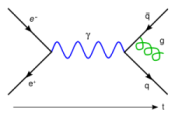
 |
Symbolic Computation and Quantum Field Theory
Special Session at
|
Feynman parameter integrals play an important role in perturbative quantum theory. Depending on the mass-scale parameters of the problem and the number of external invariants, these multiple integrals can be written in Mellin space, e.g., in terms of generalized hypergeometric multi-sums. Then the resulting sum expressions in terms of e (the divergent integrals are regularized by analytical continuation of the space-time to the dimension 4 – 2e for a small parameter e) and of the Mellin parameter N are considered in its Laurent series expansion w.r.t. e. For instance, in single scale problems up to loop order 3 the coefficients of the corresponding Laurent expansion can be simplified to closed form in terms of nested harmonic sums. Within the physics community, highly specialized efficient algorithms and software, like Vermaseren's package SUMMER implemented in FORM, have been developed for carrying out these computations for the sum expressions.
Mostly independent of these developments, algorithms for symbolic summation and integration have ever since been subject to research in computer algebra. Today, a fairly far developed algebraic summation and integration theory is available which gives rise to algorithms applicable to to a wide class of problems. Implementations of these algorithms are also available and these have been able to discover and/or prove many deep identities in special functions and combinatorics in the past. It turns out that the more general algorithms arising from this research can also be successfully applied in particle physics.
In the session, we want to bring together people from both sides, to present the different techniques, and to discuss possible combinations that may help in handling challenging problems from quantum field theory.
Room B
Wednesday, July 30, 14.00--18.30.
| 14.00--14.30 |
Johannes Blümlein,
DESY Zeuthen:
Relations between Nested Multiple Harmonic Sums
slides
Abstract: Algebaric and structural relations between nested harmonic sums are discussed. While the former ones solely derive from the index sets, the latter can be deduced from their Mellin-integral representations. The complex analysis of the harmonic sums w.r.t. the outer summation parameter is derived. |
|
| 14.30--15.00 | Coffee break | |
| 15.00--15.30 |
Stefan Weinzierl,
THEP Mainz:
Perturbative calculations with shuffle algebras and polylogs
slides
Abstract: Perturbative calculations in quantum field theory involve the computation of Feynman loop integrals. In this talk I discuss how computer algebra can be used to facilitate the calculation of loop integrals. An example are algorithms based on shuffle or quasi-shuffle algebras. |
|
| 15.30--16.00 |
Sebastian Klein,
DESY Zeuthen:
Mathematical structure of heavy flavor operator matrix elements
at O(as2) and beyond
slides
Abstract: A precise knowledge of the heavy flavor contributions to the structure functions is needed to perform precision tests of QCD based on deep-inelastic scattering data. We report on recent calculations of the heavy flavor Wilson coefficients to O(as2) and on first results relevant at O(as3) in the region Q2/m2 => 10. We make use of the technique of heavy operator matrix elements and particularily emphasize techniqual aspects of our calculation, which we perform in Mellin-space. This includes the representation of the Feynmann-paremeter integrals in terms of generalized hypergeometric functions and the subsequent summation of infinite sums into harmonic sums. |
16.00--16.30 | Jos Vermaseren,
NIKHEF Amsterdam:
FORM and Field Theory
slides
Abstract: The symbolic manipulation package FORM has been developed in parallel with the developing needs of Quantum Field Theory (QFT). I will show a few of the problems for which FORM was essential for their solution. Then I will show what is worked at currently in QFT and hence, what are some of the needs and developments in the future. |
| 16.30--17.00 | Coffee break | 17.00--17.30 |
Peter Paule, RISC Linz:
Special Functions & Computer Algebra: New Methods and Paradigms
Abstract: The "Handbook of Mathematical Functions" (Abramowitz/Stegun, 1964) is one of the mostly cited scientific reference works. A prominent part of the citations come from the side of physicists who need to manipulate special functions in their daily work. The relevance of recent computer algebra methods for assisting in this task is reflected by the fact that the forthcomming "Digital Library of Mathematical Functions", the successor project to the "Handbook", includes a respective chapter. The talk gives a brief survey on the evolution of methods. |
| 17.30--18.00 |
Flavia Stan, RISC Linz:
On Recurrences for Ising Integrals
Abstract: We use WZ-summation methods to compute recurrences for the Ising-class integrals Cn,k. In this context, we describe an algorithmic approach to obtain homogeneous and inhomogeneous recurrences for a general class of multiple contour integrals of Barnes' type. |
|
| 18.00--18.30 |
Carsten Schneider,
RISC:
Difference field algorithms for Quantum Field Theory
slides
Abstract: Symbolic summation in the context of difference fields has been applied effectively in various areas of mathematics (like, e.g., in combinatorics or special functions). In order to attack the extremely big input arising from the evaluation of Feynman diagrams, refined difference field algorithms have been developed. In this talk we report on these new algorithms implemented in the summation package Sigma and illustrate their successful application with concrete examples from QFT. |